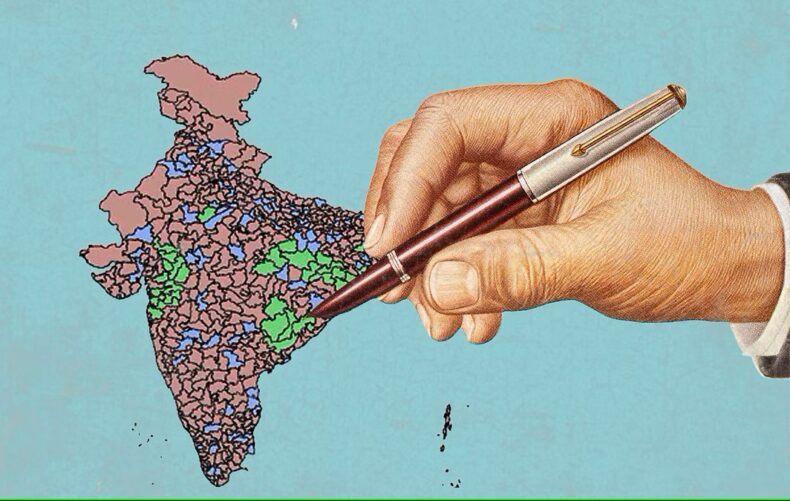Delimitation refers to the process of readjusting the boundaries of parliamentary or assembly constituencies in order to allocate seats based on population representation. The primary objective is to ensure that each representative, whether a member of the Parliament or the state legislature, represents an equal number of constituents. To accomplish this, the Constitution of India mandates that delimitation should take place following a Census, which is an official survey to determine population figures.

However, the scheduled Census for 2021 was postponed initially due to the COVID-19 pandemic. Subsequently, the current government led by Prime Minister Narendra Modi has yet to initiate the process, leading to criticism from opposing political parties for perceived delays.
The process of delimitation was initially conducted in 1952 after the completion of the 1951 census, resulting in the allocation of 494 Lok Sabha seats. The subsequent delimitation took place in 1963 following the reorganization of states in 1956, which led to an increase in the number of Lok Sabha seats to 522.
India’s recently constructed Parliament building has a seating capacity of 888 members in the Lok Sabha chamber. Currently, there are only 543 constituencies in India. Concerns have arisen among opposition parties regarding the unoccupied seats, as they fear that the Bharatiya Janata Party (BJP)-led government may pursue delimitation to increase the number of Lok Sabha constituencies. If such a delimitation occurs, it would be the first one in almost fifty years.
Election Commission Team to Arrive in Guwahati Today for Delimitation Exercise
A complete delegation from the Election Commission of India (ECI) is set to arrive in Guwahati, Assam today. Over the course of three days, public hearings will be conducted to address the suggestions and objections received from various stakeholders regarding the draft proposal on the delimitation of Assembly and Parliamentary constituencies in Assam.
It has been reported that approximately five hundred (500) suggestions have been submitted to the ECI regarding the draft document. The publication of the draft delimitation proposal by the ECI on June 20, 2024, along with the forthcoming public hearings from July 19th to July 21st, 2024, signifies the ECI’s commitment to ensuring a well-organized and inclusive process for public engagement.
However, the delimitation exercise has attracted significant attention, as a considerable number of political parties, political leaders, organizations, and individuals have already submitted petitions against it in the Supreme Court.
Delimitation Dilemma: A Critical Analysis
The delimitation exercise, despite its purported purpose of ensuring fair representation, has drawn significant criticism and skepticism. One key concern revolves around the potential for political gerrymandering. There is a fear that the ruling party may exploit the delimitation process to their advantage by strategically redrawing constituency boundaries to consolidate their electoral prospects.
Moreover, the lack of transparency and inclusivity in the delimitation exercise has been a subject of criticism. Stakeholders, including political parties, leaders, and organizations, have voiced their discontent with the limited opportunities for meaningful participation and public input. This raises doubts about the credibility and legitimacy of the delimitation process.
Another point of contention is the timing of the exercise. Some argue that conducting delimitation without a recent census undermines its accuracy and fairness. The delay in conducting the census, coupled with the potential increase in the number of Lok Sabha constituencies, further fuels suspicions of political motives behind the delimitation exercise.
Overall, a critical analysis of the delimitation exercise reveals concerns about potential political manipulation, lack of transparency, limited public participation, and the timing of the process. These issues call into question the fairness and integrity of the delimitation exercise and highlight the need for comprehensive reforms to ensure a genuinely representative and inclusive electoral system.













